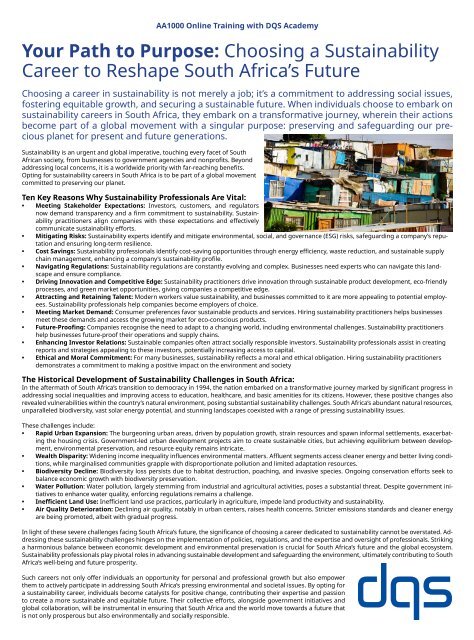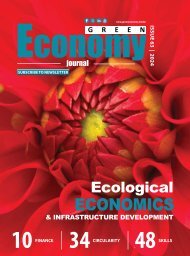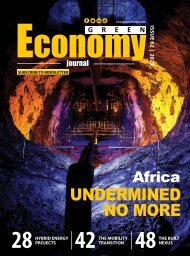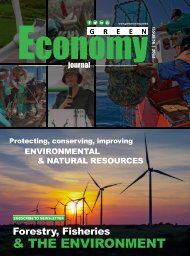Green Economy Journal Issue 60
Create successful ePaper yourself
Turn your PDF publications into a flip-book with our unique Google optimized e-Paper software.
AA1000 Online Training with DQS Academy<br />
Your Path to Purpose: Choosing a Sustainability<br />
Career to Reshape South Africa’s Future<br />
Choosing a career in sustainability is not merely a job; it’s a commitment to addressing social issues,<br />
fostering equitable growth, and securing a sustainable future. When individuals choose to embark on<br />
sustainability careers in South Africa, they embark on a transformative journey, wherein their actions<br />
become part of a global movement with a singular purpose: preserving and safeguarding our precious<br />
planet for present and future generations.<br />
Sustainability is an urgent and global imperative, touching every facet of South<br />
African society, from businesses to government agencies and nonprofits. Beyond<br />
addressing local concerns, it is a worldwide priority with far-reaching benefits.<br />
Opting for sustainability careers in South Africa is to be part of a global movement<br />
committed to preserving our planet.<br />
Ten Key Reasons Why Sustainability Professionals Are Vital:<br />
• Meeting Stakeholder Expectations: Investors, customers, and regulators<br />
now demand transparency and a firm commitment to sustainability. Sustainability<br />
practitioners align companies with these expectations and effectively<br />
communicate sustainability efforts.<br />
• Mitigating Risks: Sustainability experts identify and mitigate environmental, social, and governance (ESG) risks, safeguarding a company’s reputation<br />
and ensuring long-term resilience.<br />
• Cost Savings: Sustainability professionals identify cost-saving opportunities through energy efficiency, waste reduction, and sustainable supply<br />
chain management, enhancing a company’s sustainability profile.<br />
• Navigating Regulations: Sustainability regulations are constantly evolving and complex. Businesses need experts who can navigate this landscape<br />
and ensure compliance.<br />
• Driving Innovation and Competitive Edge: Sustainability practitioners drive innovation through sustainable product development, eco-friendly<br />
processes, and green market opportunities, giving companies a competitive edge.<br />
• Attracting and Retaining Talent: Modern workers value sustainability, and businesses committed to it are more appealing to potential employees.<br />
Sustainability professionals help companies become employers of choice.<br />
• Meeting Market Demand: Consumer preferences favor sustainable products and services. Hiring sustainability practitioners helps businesses<br />
meet these demands and access the growing market for eco-conscious products.<br />
• Future-Proofing: Companies recognise the need to adapt to a changing world, including environmental challenges. Sustainability practitioners<br />
help businesses future-proof their operations and supply chains.<br />
• Enhancing Investor Relations: Sustainable companies often attract socially responsible investors. Sustainability professionals assist in creating<br />
reports and strategies appealing to these investors, potentially increasing access to capital.<br />
• Ethical and Moral Commitment: For many businesses, sustainability reflects a moral and ethical obligation. Hiring sustainability practitioners<br />
demonstrates a commitment to making a positive impact on the environment and society<br />
The Historical Development of Sustainability Challenges in South Africa:<br />
In the aftermath of South Africa’s transition to democracy in 1994, the nation embarked on a transformative journey marked by significant progress in<br />
addressing social inequalities and improving access to education, healthcare, and basic amenities for its citizens. However, these positive changes also<br />
revealed vulnerabilities within the country’s natural environment, posing substantial sustainability challenges. South Africa’s abundant natural resources,<br />
unparalleled biodiversity, vast solar energy potential, and stunning landscapes coexisted with a range of pressing sustainability issues.<br />
These challenges include:<br />
• Rapid Urban Expansion: The burgeoning urban areas, driven by population growth, strain resources and spawn informal settlements, exacerbating<br />
the housing crisis. Government-led urban development projects aim to create sustainable cities, but achieving equilibrium between development,<br />
environmental preservation, and resource equity remains intricate.<br />
• Wealth Disparity: Widening income inequality influences environmental matters. Affluent segments access cleaner energy and better living conditions,<br />
while marginalised communities grapple with disproportionate pollution and limited adaptation resources.<br />
• Biodiversity Decline: Biodiversity loss persists due to habitat destruction, poaching, and invasive species. Ongoing conservation efforts seek to<br />
balance economic growth with biodiversity preservation.<br />
• Water Pollution: Water pollution, largely stemming from industrial and agricultural activities, poses a substantial threat. Despite government initiatives<br />
to enhance water quality, enforcing regulations remains a challenge.<br />
• Inefficient Land Use: Inefficient land use practices, particularly in agriculture, impede land productivity and sustainability.<br />
• Air Quality Deterioration: Declining air quality, notably in urban centers, raises health concerns. Stricter emissions standards and cleaner energy<br />
are being promoted, albeit with gradual progress.<br />
In light of these severe challenges facing South Africa’s future, the significance of choosing a career dedicated to sustainability cannot be overstated. Addressing<br />
these sustainability challenges hinges on the implementation of policies, regulations, and the expertise and oversight of professionals. Striking<br />
a harmonious balance between economic development and environmental preservation is crucial for South Africa’s future and the global ecosystem.<br />
Sustainability professionals play pivotal roles in advancing sustainable development and safeguarding the environment, ultimately contributing to South<br />
Africa’s well-being and future prosperity.<br />
Such careers not only offer individuals an opportunity for personal and professional growth but also empower<br />
them to actively participate in addressing South Africa’s pressing environmental and societal issues. By opting for<br />
a sustainability career, individuals become catalysts for positive change, contributing their expertise and passion<br />
to create a more sustainable and equitable future. Their collective efforts, alongside government initiatives and<br />
global collaboration, will be instrumental in ensuring that South Africa and the world move towards a future that<br />
is not only prosperous but also environmentally and socially responsible.<br />
AA1000 Online Training with DQS Academy<br />
Becoming a Certified Sustainability Practitioner!<br />
The AA1000 Online Training consists of just three modules, each designed to empower you<br />
with the knowledge and skills needed to advance sustainability initiatives. This is an exclusive<br />
and comprehensive e-learning program offered by DQS Academy, one of the few accredited<br />
training bodies in the world with the capacity to provide AA1000 Online Training.<br />
Module A - Building the Foundation<br />
Module A serves as the essential introduction to the AA1000 Online Training program. This module<br />
focuses on the AA1000AP (2018) and AA1000SES (2015) standards, which are fundamental to<br />
the practice of sustainability assurance.<br />
Learning Outcomes:<br />
• Gain a deep understanding of the AA1000 standards, which are globally recognised in the<br />
sustainability field.<br />
• Explore the principles of accountability and stakeholder engagement, which form the core of<br />
sustainability practices.<br />
Module B - Becoming a Sustainability Practitioner<br />
This module is known as the Sustainability Practitioner Certificate, and focuses on the application<br />
and reporting of each AccountAbility Principle. Completing this course, in conjunction with Module<br />
A, earns participants the title of Sustainability Practitioner.<br />
Learning Outcomes:<br />
• Develop practical skills in applying sustainability principles to real-world scenarios.<br />
• Learn how to assess, report on, and enhance sustainability performance within organisations.<br />
• Gain insights into sustainability best practices and how they can drive positive change.<br />
Module C - The ACSAP Certification<br />
This module is designed to equip you with the hands-on expertise needed to make a tangible<br />
impact on sustainability practices and is the practitioner-level training in sustainability assurance.<br />
This module focuses on foundational sustainability assurance knowledge using the AA1000AS v3<br />
standard.<br />
Learning Outcomes:<br />
• Deepen your understanding of sustainability assurance practices and principles.<br />
• Gain expertise in assessing and reporting on sustainability performance in a comprehensive<br />
and credible manner.<br />
• Learn how to provide valuable insights and recommendations to organisations seeking to<br />
improve their sustainability practices.<br />
Upon successful completion of this program,<br />
you will achieve the Associate<br />
Certified Sustainability Assurance<br />
Practitioner (ACSAP) qualification. This<br />
achievement represents a substantial<br />
milestone on your path toward acquiring<br />
more advanced certifications, including<br />
the prestigious Practicing Certified<br />
Sustainability Assurance Practitioner<br />
(PCSAP) and the esteemed Lead CSAP<br />
Practitioner (LCSAP) qualifications.<br />
These higher-level certifications open<br />
doors to rewarding career opportunities<br />
and leadership roles in the field of<br />
sustainability, equipping you to make<br />
a meaningful impact on organisations,<br />
communities, and the environment in<br />
South Africa, and abroad.<br />
www.dqsglobal.com<br />
Scan Here to Enrol in Module A<br />
Scan Here to Enrol in Module B<br />
Scan Here to Enrol in Module C

















